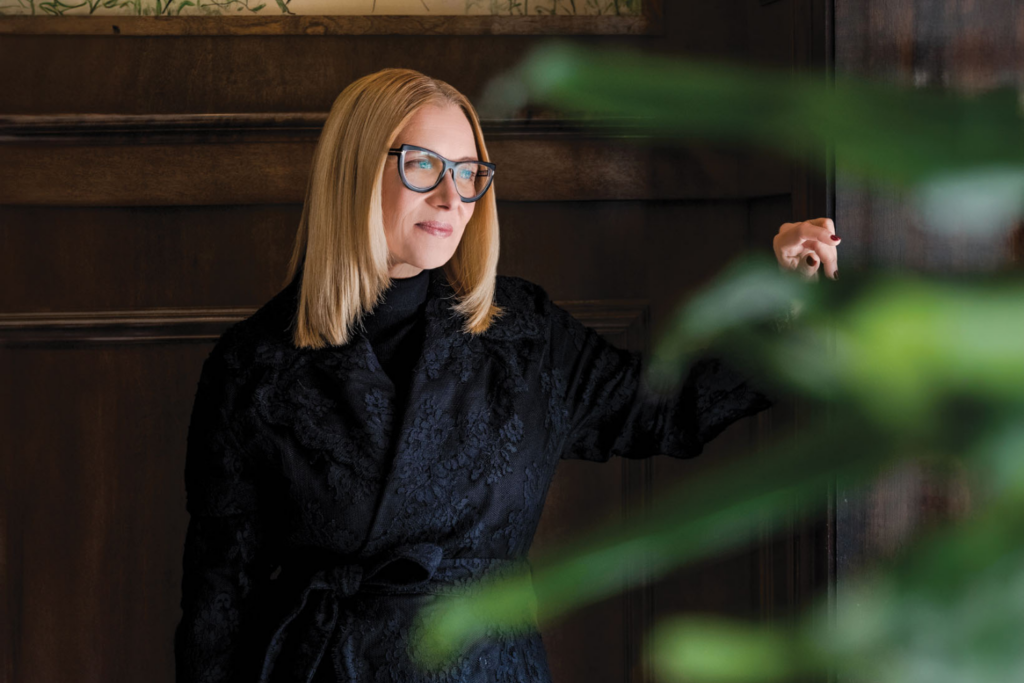Nicoletta Mantovani glides into Naples Fifth Avenue South’s lively Italian café Dolce & Salato wearing a black blazer, colorful scarf and her signature thick-rimmed, cat-eye glasses.
“Un macchiato, grazie,” she says with the casual charm of someone who visits the same cafe each morning to enjoy the quiet alongside white-whiskered men and their folded periodicals. Nicoletta’s easy elegance is disarming, and despite a thick Italian accent that flows one word into the next, she seems at home in Southwest Florida.
The Bologna-born woman is president of the Luciano Pavarotti Foundation and the widow of the nonprofit’s namesake opera tenor. Luciano helped popularize opera in the United States as one of the first crossover opera stars (many remember his charity concerts with Bono, Sting, Sheryl Crow and other pop icons). And Nicoletta carries his legacy like a cultural torch.
Last November, she announced a collaboration with Opera Naples to build the roughly $30 million Theater in the Garden, a cultural campus complete with a 900-seat opera theater. Plans for the foundation’s first headquarters outside of Modena, Italy, include a restaurant, an academy to train underprivileged youth, an outdoor amphitheater, lush gardens, and a museum designed as a replica of Luciano and Nicoletta’s home in Italy. The theater is modeled after England’s famed The Grange Theatre, with its lofty acoustics and grand design.
Nicoletta first visited Naples less than a year ago, but she is already positioning herself as a central figure in the arts scene. In December, before the parcel of land in the Bayshore Arts District was identified for Theater in the Garden, Nicoletta served as honorary chair of Opera Naples’ annual gala fundraiser. “We’ll enjoy Naples for a long time,” Nicoletta says of her new home away from home.
When Livio Ferrari, co-founder of Opera Naples, proposed the idea for Theater in the Garden to Nicoletta, she pondered what Luciano would say. She recognized Southwest Florida’s potential to become a bastion of fine arts, with the upcoming Gulfshore Playhouse complex and institutions like Artis—Naples, along with the two existing opera troupes in the relatively small region, three symphonies and more than a dozen theater companies. “The people here have such enthusiasm for the arts,” Nicoletta says. And, since her maestro husband had made his American debut nearby in Miami in 1965, she decided Luciano would approve of the charming city by the sea.
Seventeen years have passed since Luciano died of pancreatic cancer, but talking to Nicoletta, you would think he’s still right by her side. She often calls on his memory for wisdom and warmth. The stories, jokes and conversations Nicoletta recounts of him are fresh and unburdened, as if he had sent her off to lunch with a kiss, soon to reunite.
When the pair met at a horse race in 1993, Pavarotti was already a household name. At 57, Luciano had garnered acclaim for his rich voice and larger-than-life personality. He was one of the famed Three Tenors, with Plácido Domingo and José Carreras, who spread the love of opera beyond the elite. Nicoletta, on the other hand, was a pragmatic 23-year-old college student with no notable connection to opera. Still, the two were drawn together—deep thinkers with big hearts who accepted nothing at face value. Luciano hired her as his assistant, and somewhere during conversations about purpose, happiness and fulfillment, their bond deepened to love.
The couple was inseparable, jet-setting around the world for opera performances in world-class theaters. When Nicoletta suggested Luciano’s annual charity pop-meets-opera show, Pavarotti & Friends, could have been better, he challenged the then-25-year-old to plan the next concert herself. “Luciano told me, ‘You cannot criticize without doing it yourself, so either you organize the next show or shut up,’” Nicoletta remembers, laughing. She would maintain ownership of the show for years to come.
Luciano stood in the limelight. Nicoletta stood between him and the press. When she spoke, she spoke of Luciano. She still does. “I felt that I owe this to him. In a way, it’s something that keeps us still together,” she says. “Divided from up and down, but still a team.”
To her friends, though, she’s more than the widow of Pavarotti. She’s Nico, a chatty, insightful insect lover and mother with a heart for children, a penchant for driving fast, and a hearty laugh punctuated by sharp inhales. Nicoletta didn’t care much for opera when she met Luciano. She received a degree in natural science from Università di Bologna and centered her studies around her biggest fear at the time: bugs. “It’s similar to my story of opera,” Nicoletta says. “When you understand insects, where the heart is, the eyes and liver—it makes you have less fear and get more interested … If you go in deep, you’ll find a fantastic world inside.”
Fitting for someone in a passion-driven, creative field, Luciano was challenging and, at times, mercurial. He objected to purple clothing, which reminded the tenor of death, and didn’t let Nicoletta display her insect cases around the house. “That was forbidden,” she says, still amused.
But Nicoletta was happy to let him shine. “Of course, Luciano doesn’t need me to be remembered. His voice will be there forever,” she says. “But to add what it did for the world, what it did for the young generation, what it did for the world of opera—it’s important.”
The past 17 years have represented a period of rediscovery for Nicoletta. She now places her bugs prominently around her home. Luciano often emphasized the importance of finding joy in the here and now. When asked what brings her joy today, Nicoletta says: “My daughter and my husband. These have always been the important things in my life—being loved by my family and friends. With the new project, love is what gives me the gasoline to start.” Nicoletta married financier Alberto Tinarelli in 2020.
Her love of opera, which developed organically and profoundly over her 14 years with Luciano, remains intact. “I was a challenge for him,” she says. “He used to say, ‘You can’t say you don’t like opera, you don’t know what it is.’” As she dove into his world, she fell for the talent and raw emotion behind opera. The music, she learned, was not stuffy and foreign—it portrayed passion that words alone could not. Nicoletta thought that if she could learn to love opera, maybe she could teach others to do so, too.
Spreading an appreciation of opera is the heart of the Pavarotti mission. “We need to create a new audience for opera, and you are able to create the audience of the future if you are able to speak to the younger generation,” Nicoletta says. For a young Luciano, opera was salvation from fear. He grew up in Modena in the midst of World War II. As bombardments rocked the Italian city, people sang opera in the streets to drown out the sound of explosions. “[Singing] helped keep him calm,” Nicoletta says.
When the couple traveled for Luciano’s work, they’d visit orphanages and give opera lessons. They opened therapeutic and educational centers in war-torn countries like Guatemala and Cambodia.
On many occasions, the Pavarottis flew children to Italy to perform at Pavarotti & Friends charity concerts. When the United States pulled its troops out of Afghanistan in 2021, several of the children the Pavarottis flew in for the 2001 concert—by then, adults—were trapped in the conflict. One was working with United States forces. They called Nicoletta for help. She and her team spent weeks making calls at all hours and pulling whatever strings they could. Everyone made it to safety. “They showed us the concert pass that they used at that time,” she recalls. “They kept it.”
In Naples, Nicoletta is ensuring that any local performing arts organization can use Theater in the Garden and that part of the programming is free to the public. She points to theaters in Milan that recently introduced a night for attendees under 30 with reduced pricing. The first show was an unmitigated success. “It was completely packed,” she says excitedly. “That is a big signal. You have the interest, but it costs too much, and we are not here to make money. We are here to invest in culture.”





